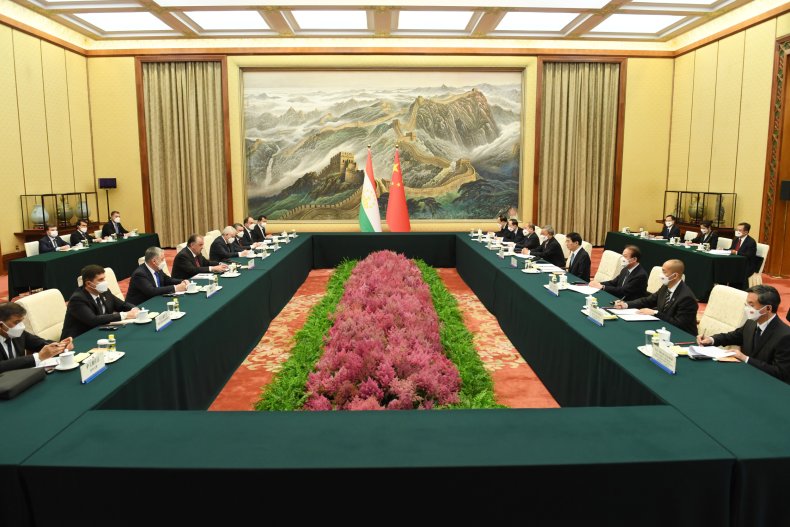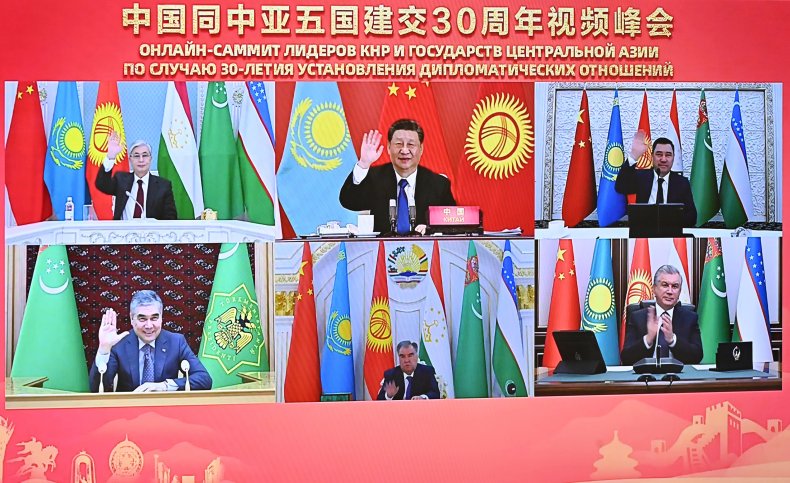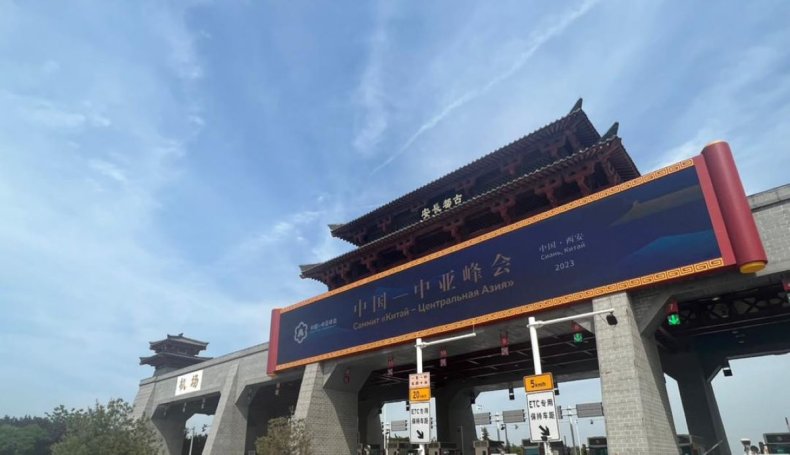TOM O'CONNOR
In a landmark summit that overlaps with U.S. President Joe Biden's travel to the Group of Seven (G7) meeting in Japan this weekend, China is stepping up its position in Central Asia, showcasing a campaign to boost economic, political and security relations in a region long within the sphere of Russian influence.
The two-day gathering, set to begin Thursday in the Chinese city of Xi'an, will bring together President Xi Jinping with his counterparts from Kazakhstan, Kyrgyzstan, Tajikistan, Turkmenistan and Uzbekistan. It will mark the Chinese leader's latest high-profile engagement at a time when Beijing and Washington are grappling for global clout.
Coming just a week after the heads of state of all five Central Asian nations traveled to Moscow to attend Victory Day celebrations marking the Soviet Union's victory over Nazi Germany in World War II despite regional reservations over Russia's ongoing war in Ukraine, the first-ever China-Central Asia Summit demonstrates a "regional unity and regional consensus that is shown towards Russia and China," according to Niva Yau, nonresident fellow at the Atlantic Council's Global China Hub.
"I think the Central Asian countries have made up their mind with regards to the fact that the fate of the region is in the hands of Russia and China," Yau told Newsweek.
For China, in particular, she argued, "it's a very good opportunity to come in and further strengthen its various dominance in the region, in terms of economy, in terms of security and social things, and so on and so forth."
"And, of course," she added, "for China, the biggest goal that it has in Central Asia is to have the region strengthen its legitimacy over Xinjiang, the region that feeds the Chinese economy in terms of energy and raw material."
Xinjiang, whose eight international borders include three Central Asian countries, is also at the center of Washington's accusations against Beijing of committing "genocide" against China's largely Muslim community of Uyghurs in the form of mass detentions. The People's Republic vehemently denies the allegation, arguing that it is a security issue rooted in a Uyghur militancy with the potential for resurgence in the wake of the U.S. military withdrawal from neighboring Afghanistan.
"This is always the core reason that drives China to increase evermore various initiatives and build presence in the region," Yau said. "And I think, unfortunately, the U.S. doesn't have this level of motivation for its engagement in Central Asia, thus resulting in projects that cannot be seen as a match to what China does in the region."
 A delegation led by Tajikistan President Emomali Rahmon meets with Chinese People's Conference Chair Wang Huning and his team in Xi'an on May 17, ahead of the first-ever China-Central Asia Summit.PRESIDENCY OF THE REPUBLIC OF TAJIKISTAN PRESS SERVICE
A delegation led by Tajikistan President Emomali Rahmon meets with Chinese People's Conference Chair Wang Huning and his team in Xi'an on May 17, ahead of the first-ever China-Central Asia Summit.PRESIDENCY OF THE REPUBLIC OF TAJIKISTAN PRESS SERVICEThe sprawling Central Asia region is located at the heart of the continent, bordered by Russia to the north, Afghanistan and Iran to the south, China to the east and the Caspian Sea to the west. For much of the 20th century, it was under the direct control of the Soviet Union, and has remained close to the Russian Federation since the five countries that make up modern Central Asia gained independence in the early 1990s.
During a different era for U.S.-Russia relations, Washington and its NATO allies managed to establish a military presence in Kyrgyzstan, Tajikistan and Uzbekistan as part of the lengthy war effort against the Taliban in Afghanistan. But this foothold would not last, as Western troops left the region in 2014 amid concerns over potential spillover effects of what would be a two-decade conflict.
Staunch Russian opposition hindered U.S. efforts to reestablish military ties in the leadup to and in the wake of the U.S. military exit from Afghanistan in August 2021 that led to the Taliban taking control of the country. Today, three Central Asian nations—Kazakhstan, Kyrgyzstan and Tajikistan—are part of Russia's Collective Security Treaty Organization (CSTO) post-Soviet military alliance and a fourth—Uzbekistan—joins them in the Shanghai Cooperation Organization (SCO) security bloc led by both Moscow and Beijing.
While the CSTO mobilized in January 2022 in response to widespread unrest in Kazakhstan, the SCO has especially grown in relevance as the coalition draws interest from a growing list of countries, including both Iran and Saudi Arabia, which reestablished their diplomatic relations in March under a deal brokered by China. This trend, alongside fears of how worsening U.S. relations with both China and Russia could affect the region's links to global trade, have helped to create closer ties between Central Asian nations and their two largest neighbors.
"There was quite a lot of talk in the region about whether or not the region needs to be moving away from Russia because of the war [in Ukraine], and look more towards the West," Yau said. "And also, there are discussions that if China were to really make a move on Taiwan, then the region would be totally trapped between China and Russia because they have no other physical route that can actually facilitate trade at all."
"So, in that scenario," she added, "they will be completely cut off by global sanctions and they will have no choice but to sink deeper into the orbit of Russia and China."
Yang Jiang, a senior researcher at the Danish Institute for International Studies, said "there is some awakening in Europe and the U.S. about the importance" of Central Asia.
This realization was apparent during the most recent C5+1 foreign ministers' meeting held in late February, when Secretary of State Antony Blinken emphasized the U.S. commitment to the region. But Jiang sees the effort coming up short.
"I don't think it's sufficient," she told Newsweek.
 Chinese President Xi Jinping (top row, center) hosts a call with his counterparts Kassym-Jomart Tokayev of Kazakhstan, Sadyr Japarov of Kyrgyzstan, Emomali Rahmon of Tajikistan, Gurbanguly Berdymukhamedov of Turkmenistan and Shavkat Mirziyoyev of Uzbekistan during a call to commemorate 30 years of diplomatic ties on January 25, 2022. The leaders of all six nations, including Berdymukhamedov's son and successor, Serdar, will attend the first-ever May 18-19 China-Central Asia Summit in Xi'an.
Chinese President Xi Jinping (top row, center) hosts a call with his counterparts Kassym-Jomart Tokayev of Kazakhstan, Sadyr Japarov of Kyrgyzstan, Emomali Rahmon of Tajikistan, Gurbanguly Berdymukhamedov of Turkmenistan and Shavkat Mirziyoyev of Uzbekistan during a call to commemorate 30 years of diplomatic ties on January 25, 2022. The leaders of all six nations, including Berdymukhamedov's son and successor, Serdar, will attend the first-ever May 18-19 China-Central Asia Summit in Xi'an.Jiang argued that initiatives such as Biden's "Build Back Better World," billed as a multitrillion-dollar effort to address development and infrastructure needs across the globe, has so far mostly focused on the Asia-Pacific region, the primary battleground for U.S.-China influence. But she noted that "a lot of U.S. engagement with Central Asia still has priority on the military, which is now certainly limited because of Russia's concerns."
Jiang also identified a "mismatch" when it comes to Central Asia's position on the U.S.-China rivalry.
"The U.S. does have a very much value-based politics, [such as] democracy, and tries to say that China is a threat," Jiang said, "whereas Central Asian governments are trying to say that 'We do not share the same concern as the U.S. about China's influence, or its economic relations with Central Asia, because we need development.'"
Tapping into historic links paved by the ancient Silk Road that ran through Central Asia, Xi's modern intercontinental Belt and Road Initiative has provided an answer to some of the region's most pressing infrastructure issues without political strings attached. But Beijing has also moved beyond investment to security issues, including human and drug trafficking, as well as what Chinese officials commonly refer to as "the three evils" of separatism, terrorism and extremism.
Just as Central Asian governments strive to preserve international economic links, strong ties and stability in the region are also important for both China and Russia as they seek to maintain robust land routes to avoid existing or potential U.S. sanctions. As such, Jiang said she did not "believe that China has tried to replace Russia, especially in terms of its strategic influence and cultural influence," even if "economically, China is definitely a stronger power than Russia."
Shen Shiwei, a Chinese analyst and journalist currently in Xi'an to attend the China-Central Asia Summit, agrees with that assessment.
"In Central Asia, China and Russia are not competing but are complementary," Shen told Newsweek. "China plays an important role in regional economic development, and Russia is still irreplaceable in terms of security and strategic stability. Within the Shanghai Cooperation Organization (SCO), China, Russia and Central Asian countries are in positive cooperation in regional security and anti-terrorism."
Shen also noted that Beijing's inroads to the region would not negatively impact the position of Washington or European capitals.
"From the Chinese perspective, China-Central Asian cooperation doesn't affect Central Asian countries' cooperation with Russia, the U.S. and Europe," Shen said. "I have studied the Western international relations theories for quite a long time, and I found that the zero-sum game theory doesn't fit the real situation in Central Asia.
"As an important land-link of Eurasia," he added, "Central Asian countries have close cooperation with China, Russia, the U.S. and Europe."
 A sign previewing the inaugural China-Central Asia Summit is seen above the highway entrance near Xi'an Airport in this photo shared with Newsweek on May 16. The summit follows the first-ever China-Arab States Summit held in Saudi Arabia last November and a number of other high-level engagements since Chinese President Xi Jinping made his first post-pandemic travel to Central Asia last September to attend the Shanghai Cooperation Organization leaders' summit.SHEN SHIWEI
A sign previewing the inaugural China-Central Asia Summit is seen above the highway entrance near Xi'an Airport in this photo shared with Newsweek on May 16. The summit follows the first-ever China-Arab States Summit held in Saudi Arabia last November and a number of other high-level engagements since Chinese President Xi Jinping made his first post-pandemic travel to Central Asia last September to attend the Shanghai Cooperation Organization leaders' summit.SHEN SHIWEIIn fact, Central Asia has proven a crucial hub to allow China to deepen its economic role within Europe. This development has been demonstrated by the China-Europe Railway Express, with routes passing through Russia, though it now faces obstacles in reaching its European destinations due to Western sanctions levied over the Ukraine conflict.
And while Central Asian states have not expressed support for Russia's war effort, Shen said they also wanted to avoid losing out to economic opportunities as a result of great-power rivalries or aligning themselves with forces interested in changing their political landscape.
"Like many Global South countries, Central Asian countries have reiterated that they are opposed to being pressured to pick sides," Shen said. "China and Central Asian countries have a strong consensus of firmly opposing attempts by external forces to foment color revolutions in Central Asia, firmly oppose interference in other countries' internal affairs under the pretext of human rights, and firmly oppose any force that tries to disrupt the tranquil life of the people of the six countries."
Central Asia's efforts to balance and maintain separate relations with China, Russia and the U.S. may be put to the test, however, as a scramble for key resources, including rare earth minerals, intensifies amid worsening geopolitical feuds.
"China needs more mineral resources from Central Asia and needs more transport opportunities on the way to European market," Artem Dankov, a Russian International Affairs Council expert who serves as director of the Confucius Insitute and associate professor at Tomsk University, told Newsweek.
"We also need to remember that Central Asia is one of the important local markets for Chinese companies from Xinjiang and other Western provinces," he added.
Dankov also pointed out that "social and economic growth in the region is unstable," and that "some serious social and political problems" persist among the Central Asian states. Such conditions could leave Central Asia vulnerable as international frictions show no sign of abating.
"Therefore," Dankov added, "we should expect more intensified efforts in line with U.S. attempts to challenge both Russia and China on the Central Asian front."
No comments:
Post a Comment